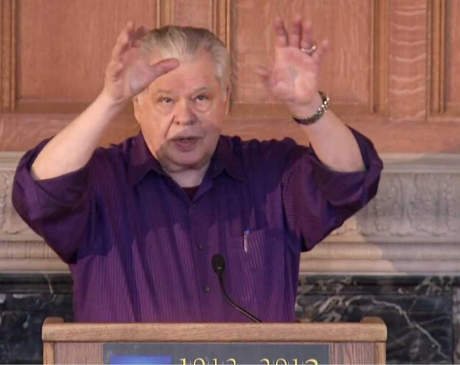Q & A: American Poetry
Q & A American Poetry: Clayton Eshleman

1. Our amplification of Walt Whitman's panopticon (phrenology, Egyptology, opera, Hinduism, the poet as a reporter and a mystic, amative and adhesive, cultured and anarchic) and his "open road": the democratization of the whole person, the liberation of impulse and instinct from involuntary servitude, a new breath line based on vernacular and natural measures. We continue to be under Whitman's charge.
2. Our invention of historical and prehistorical otherness; for Ezra Pound: ancient China; for H.D.: classical Greece; for Charles Olson: the Maya and Sumer; for Judy Grahn: merarchic metaforms; for me: the Upper Paleolithic.
3. Our view of translation as an integral part of the poet's work: Pound's Cathay; Louis Zukofsky's Catullus; Kenneth Rexroth's Chinese and Japanese anthologies; Paul Blackburn's El Cid and Provençal troubadors; Cid Corman's Basho, Montale, and Char; Richard Wilbur's Molière; Richard Howard's Baudelaire; Rosemarie Waldrop's Jabès; my Vallejo, Césaire, and Artaud; Jerome Rothenberg's Lorca (and his international anthologies); Bill Zavatsky's Breton; Ron Padgett's Cendrars and Apollinaire; Lyn Hejinian's Dragomoschenko; Robert Pinsky's Dante etc.
4. Our incorporation of multiple levels of language—the archaic, the "American idiom," the erudite, the vulgar, the scientific—along with soundtexts, sublanguages, and typographical eccentricity, into the poem's textures. A sense of relentless excitement; say anything; all words can enter into play.
5. Our incorporation of the non-poetic and the popular—reportage, history, dreams, songs, visions, librettos, chance events, comic books, legal transcripts, agit-prop—as part of an ongoing, international "grand collage." Everything is material.
6. Our belief that poetry can be institutionalized and funded—degree writing programs, professorships for poets, archival purchases, endowment and foundation support—and remain authentic.
7. Our commitment to a radical, investigational poetry that is raw, unfinished, wayward, ineluctably in process; poetry as an intervention within the culture against static forms of knowledge, against schooled conceptions and traditional formulation.
8. Our commitment to a conservative, univocal, episodic poetry employing a restricted vocabulary, grammar-book syntax, and traditional English verse forms; the world represented as it is; a poetry of "intimate, shared isolation."
9. Our vision that poetry must be political (in spite of the fact that no one in America takes the poet politically seriously), and confront racism, imperialism, ecological disaster, and war, as part of the poet's social responsibilities.
Published 1999.


